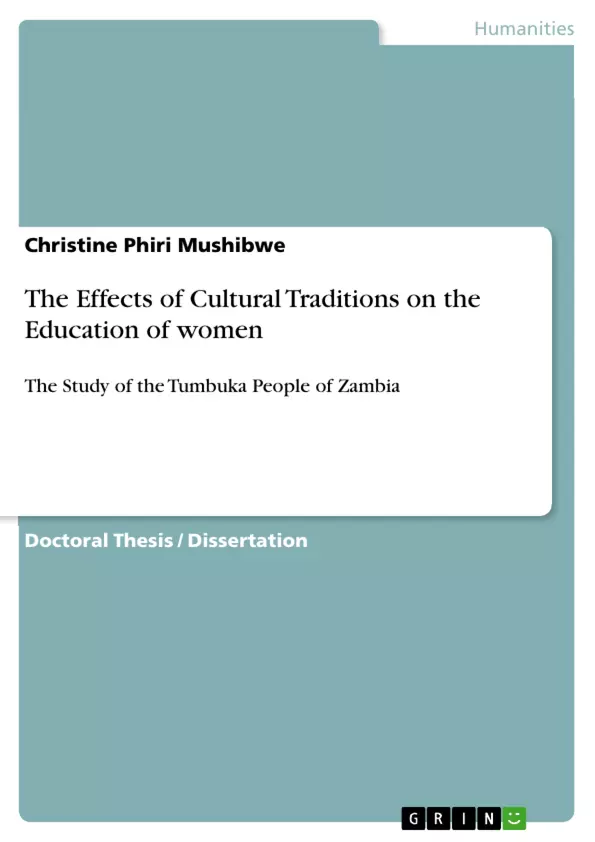The strong hold that the cultural traditions has on the locals has further resulted in conflicts with modern schooling, which is viewed as disseminating ‘white’ man’s culture and values. Established in this research is the fear and suspicion that the locals have on the outcome of their children learning these values that they see as alien to their own. The modern education provided in school is perceived as a force that undermines cultural values. It is viewed as presenting an inherent challenge to the cultural traditional control measures that are in place.
Arguably, while ethnic traditions should be respected and sustained because they define one’s identity, aspects of culture which are discriminatory, restrictive and tend to devalue women’s physical, emotional and psychological development should be eliminated because they are retrogressive. Therefore the argument that deep seated socio-cultural traditions play a significant role in encumbering female education is proven.
Table of Contents
- Abstract
- Acronyms
- List of Appendices
- Acknowledgement
- CHAPTER 1
- Introduction
- Inspiration for the Research
- The Tumbuka Tribe
- Defining the Concepts
- The Structure of this Study
- CHAPTER 2
- Introduction
- Statement of the Problem
- Research Objectives and Methodology
- The Global Context of Educating a Woman
- Conclusion
- CHAPTER 3
- Introduction
- The Concept of Feminism
- Western Feminisms vs. African Feminisms
- Choice of Theory
- Theories of Gender Inequalities
- Human Capital Theory (HCT)
- Women's Movements
- Conclusion
- CHAPTER 4
- Introduction
- Review Of Previous Research Publications
- The Origins Of Traditional Teachings In Zambia
- Implications Of The Cultural Traditions
- The Tumbuka Initiation Rite (The Uzamba Ceremony)
- Conclusion
- CHAPTER 5
- Introduction
- Working With The Research Assistant
- Researcher Positionality as a Field Worker
- Ethnography
- The Pilot Stage
- Procedures
- The Research Population
- The Ethical Obligation
- Reliability and Validity
- Analysis of Collected Data
- Conclusion
- CHAPTER 6
- Introduction
- Description of the Setting
- Observed Occurrences
- Discussion and Findings
- Conclusion
- CHAPTER 7
- Introduction
- Importance of Traditions
- Mode of Transmission
- Effects of traditional teachings
- Traditions vs. Education
- Relationships
- Conclusion
- CHAPTER 8
- Introduction
- Problems Encountered
- The Theoretical Framework
- Summary of the emerging key issues
- What is the Data saying in light of the Research Objectives?
- The Education of my Fellow „Creatures!“
- The Recommendations
- REFERENCES
- BIBLIOGRAPHY
- APPENDICES
Objectives and Key Themes
This study investigates the impact of cultural traditions on female education in Zambia, specifically focusing on the Tumbuka tribe. The study employed ethnographic methods to gather data through participant observation, focus groups, in-depth interviews, narratives, and documents. The research draws upon multiple disciplines including social sciences, education, and anthropology. Key themes explored in the study include: * **The Role of Patriarchy and Cultural Traditions:** The study examines how patriarchal attitudes and cultural traditions within the Tumbuka tribe limit gender equality and reinforce male dominance. * **Impact of Initiation Rites on Female Education:** The initiation rites for girls of pubescent age, particularly the Uzamba ceremony, are analyzed for their influence on girls' access to and participation in formal education. * **The Tension Between Modern Education and Traditional Values:** The study explores how modern education is perceived by the Tumbuka community, specifically the potential conflict between Western values disseminated through schooling and traditional beliefs. * **The Influence of Traditional Beliefs on Gender Roles:** The research investigates how traditional norms and practices influence women's roles and expectations, ultimately impacting their ability to achieve equality. * **The Need for Balancing Tradition and Progress:** The study examines the need to respect and maintain cultural traditions while challenging aspects that are discriminatory and hinder women's development.Chapter Summaries
Chapter 1 introduces the study, providing background information on the research inspiration and a brief overview of the Tumbuka tribe. It also defines key concepts and outlines the structure of the study.
Chapter 2 delves into the statement of the problem, outlining the research objectives and methodology employed. It also explores the broader global context of female education.
Chapter 3 examines the theoretical framework underpinning the study, exploring feminist theories and discussing the contrast between Western and African feminisms. It also analyzes the Human Capital Theory (HCT) and its implications for gender inequalities.
Chapter 4 focuses on Zambian cultural traditions, reviewing existing research publications and exploring the origins of traditional teachings in the country. It examines the implications of these traditions for gender roles and specifically focuses on the Tumbuka initiation rite (the Uzamba Ceremony).
Chapter 5 details the methodology employed in the study, including the researcher's positionality and the use of ethnographic methods. It also discusses the pilot stage, data collection procedures, and the ethical considerations involved in the research.
Chapter 6 explores the importance of female education in the context of the Tumbuka community, presenting the research setting, observed occurrences, and a discussion of the findings.
Keywords
This study focuses on the intersection of cultural traditions, gender roles, and female education in Zambia, with a specific focus on the Tumbuka tribe. Key terms include: patriarchy, initiation rites, Uzamba ceremony, gender equality, female education, traditional beliefs, modern education, socio-cultural norms, Zambia, Tumbuka, ethnographic research, and feminist theory.- Quote paper
- Christine Phiri Mushibwe (Author), 2013, The Effects of Cultural Traditions on the Education of women , Munich, GRIN Verlag, https://www.grin.com/document/207540



